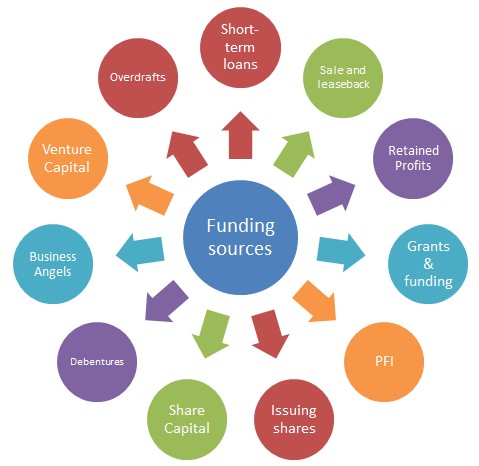Obtaining funding for your small business
The survival of every business depends on the availability of funds and the efficient management of the funds. Proper management of capital propels a business to grow and that might in turn require additional funding for the continued growth of the business.
Financing business is securing capital for business operation, and finding sources of funding is perhaps the most difficult part of all the efforts required from entrepreneurs.
This article will discuss the various sources of funding available to businesses. There is short term and long term sources of funding.
Short term source of funding
This is an act of seeking monetary funding for a time not more than a year. It is short term because its repayment does not exceed one accounting year. Examples of short term funding are discussed below.
Trade Credit
This is a major source of short-term finance for businesses. Current assets such as inventory or raw materials may be purchased on credit with payment terms normally varying between 30 to 90 working days. This represents interest free short-term financing. This method of funding is usually convenient, flexible and allows the quick growth of an entity.
Installment Credit
This is where possession of goods is taken immediately after purchase but the payment is made in installments over a period of time. Generally, interest might be charged on the unpaid price or it may be adjusted in the price.
Overdraft
This is where payment from a current account exceeds income in the account up to a certain limit for a temporary period. Generally, interest is charged on the overdrawn amount at the end of each day but the accumulated interest charged is paid at the end of month.
Letter of Credit
A letter of credit popularly known as L/C is an undertaking by a bank to honor the obligation of its customer up to a specified amount, should the customer fail to meet the obligation. It helps the customers of the bank to obtain credit from suppliers because it ensures that there is less risk of non-payment.
Advances
Some businesses get the opportunity to receive advances against orders from their customers and this serves as a source of short term funding to the business. It is one of the cheapest sources of funds to businesses. Some firms who have long production cycle such as manufacturing prefer to take advances from their customers. This aids them in the production process.
Factoring
A factor is a financial institution which offers services relating to management and financing of debts arising out of credit sales. Factors may take over the management and administration of credit sales which might allow a firm to get deposits from credit sales. This enhances the efficient utilization of funds within the organization.
On the short term sources of funds noted above, the best are generated internally through the close management of accounts receivable and inventory. Keeping these assets at a minimal level reduces your need for working capital, and hence your need for funds.
Long Term Sources of Funds
Long term financing means capital requirement for a period more than five years. This is usually sought for capital expenditure such as the purchase of land and building, plant and machinery, etc. some of the long term sources of funds are explained below.
Share Capital or Equity Shares
Equity finance is raised through the sale of ordinary shares to investors, that is giving part ownership or portion of the business to an investor. Shareholders are usually paid dividends when there is profit. They are usually called the true owners of the company.
Term Loans
A loan is for a fixed amount for a specific purpose and is payable with a predetermined interest and principal payment. The entire loan amount is usually paid to the borrower either in cash or credit to his or her account. The borrower is required to pay interest on the entire amount of the loan from the date the loan takes effect. A loan can be repayable in lump sum or in installments.
Debenture
A debenture is a type of debt instrument unsecured by collateral. It is a long term security yielding a fixed interest rate issued by a company to raise funds. Since it has no collateral backing, debentures rely on the creditworthiness of the issuer for support.
A debenture can be convertible or nonconvertible. A convertible debenture is a debenture that can convert in to equity shares of the issuing corporation after a specific period.
Nonconvertible debentures cannot be converted into equity of the issuing corporation. Usually, nonconvertible debentures have a higher interest rate than convertible debentures.
Leasing
Rather than buying an asset outright, leasing is a contract between lessor (owner of a property) and a lessee (tenant) for hiring a specific asset from a vendor or manufacturer for a period of time. There is payment of rentals by the lessee to the lessor. The contract outlines all the duties of both parties to the agreement. One party agrees to rent a property owned by another party, which guarantees the owner of the property regular payments from the lessee. The contract for the use of the property is usually for a specific period of time, the contract comes to an end when the period ends.
Venture capital
Venture capital is capital firms that invest in private companies in return for an equity stake (part of business to own). It is financing option investors provide to startup companies and small businesses that are believed to have growth potential. It does not always come in a form of cash or monetary form, it can also be provided in the form of technical and managerial expertise.
It is important to mention that all these sources have merits and demerits. The type of funding you will go in for should depend on the need or the reason why you are going in for the funds. It is very important to outline the reason for securing a fund. This will enable you to determine which source of funding you have to seek.
capitalfundingventure capital



This post addresses the pain most startups face regarding access to funds.It is a real eye-opener.